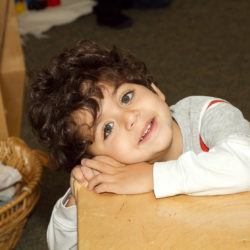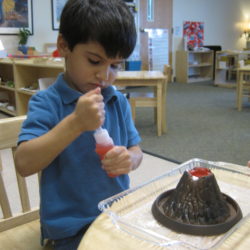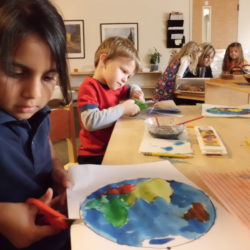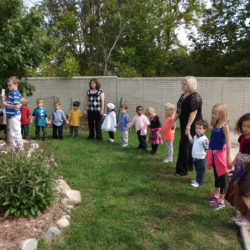Through observation, Dr. Montessori saw that at certain times in a child’s early years he/she shows heightened interest or unusual ability in acquiring particular skills and knowledge. Montessori called these “sensitive periods” and noted that they manifest at relatively the same time in the first six years of life of all children. If the child’s environment is expanded and prepared so as to “nurture” these sensitivities as they occur, the child will develop them naturally in a joyful manner.
The child enters the Montessori primary classroom preferably around three years of age. In the practical life area there are exercises to help the child care for himself and his environment. Other classroom areas foster development in sensorial, language art lessons (utilizing the phonetic method of reading) mathematics, geography, science, art, and music. The child’s sense of order and self-concept are developed. Independence is encouraged, allowing the child to feel that “I can and want to do it by and for myself.” The child remains in this level with the same teacher through kindergarten.
The Montessori classroom is a “living room” for children. The children 3-6 years of age enjoy exploring in a beautifully prepared environment scaled to their size. Children are shown precisely how to handle and use the Montessori materials. Children choose their work from among the self-correcting materials displayed on open shelves. The self-correcting quality of the work enables each child to gain greater confidence and perfection through his choice and repetition. Children gain a sense of independence as they take an active role in the classroom environment. Over a period of time, the children develop into a “normalized community,” working with high concentration and few interruptions. Normalization is the process whereby a child moves from being undisciplined to self-disciplined, from disordered to ordered, from distracted to focused, through work in the environment. The process occurs through repeated work with materials that captivate the child’s attention. For some children this inner change may take place quite suddenly, leading to deep concentration.
In the Montessori preschool, five distinct areas constitute the prepared environment:
- Practical life enhances the development of task organization and cognitive order through care of self, care of the environment, exercises of grace and courtesy, and coordination of physical movement.
- The sensorial area enables the child to order, classify, and describe sensory impressions in relation to length, width, temperature, mass, color, pitch, etc.
- Mathematics makes use of manipulative materials to enable the child to internalize concepts of number, symbol, sequence, operations, and memorization of basic facts.
- Language art includes oral language development, written expression, reading, and the study of grammar, creative dramatics, and children’s literature. Basic skills in writing and reading are developed through the use of sandpaper letters, alphabet cut-outs, and various presentations allowing children to link sounds and letter symbols effortlessly and to express their thoughts through writing.
- Cultural activities expose the child to basics in geography, history and life sciences. Music, art and movement education are part of the integrated cultural curriculum.
The preschool environment unifies the psychosocial, physical and academic of the child. Its task is to provide students with:
- An early and general foundation that includes a positive attitude toward school
- Inner security and a sense of order
- Pride in the physical environment
- Abiding curiosity
- A habit of concentration
- Habits of initiative and persistence
- The ability to make decisions
- Self-discipline
- A sense of responsibility to other members of the class, school and community
Children remain in the primary level for three years with a full-day Kindergarten program completing the cycle. Full-day students receive instructions in French. A violin program is offered for an additional charge for Kindergarten students. The Montessori prepared environment, in the primary classroom, builds a strong general foundation. This foundation will enable them to acquire more specialized knowledge and skills throughout their school career.




